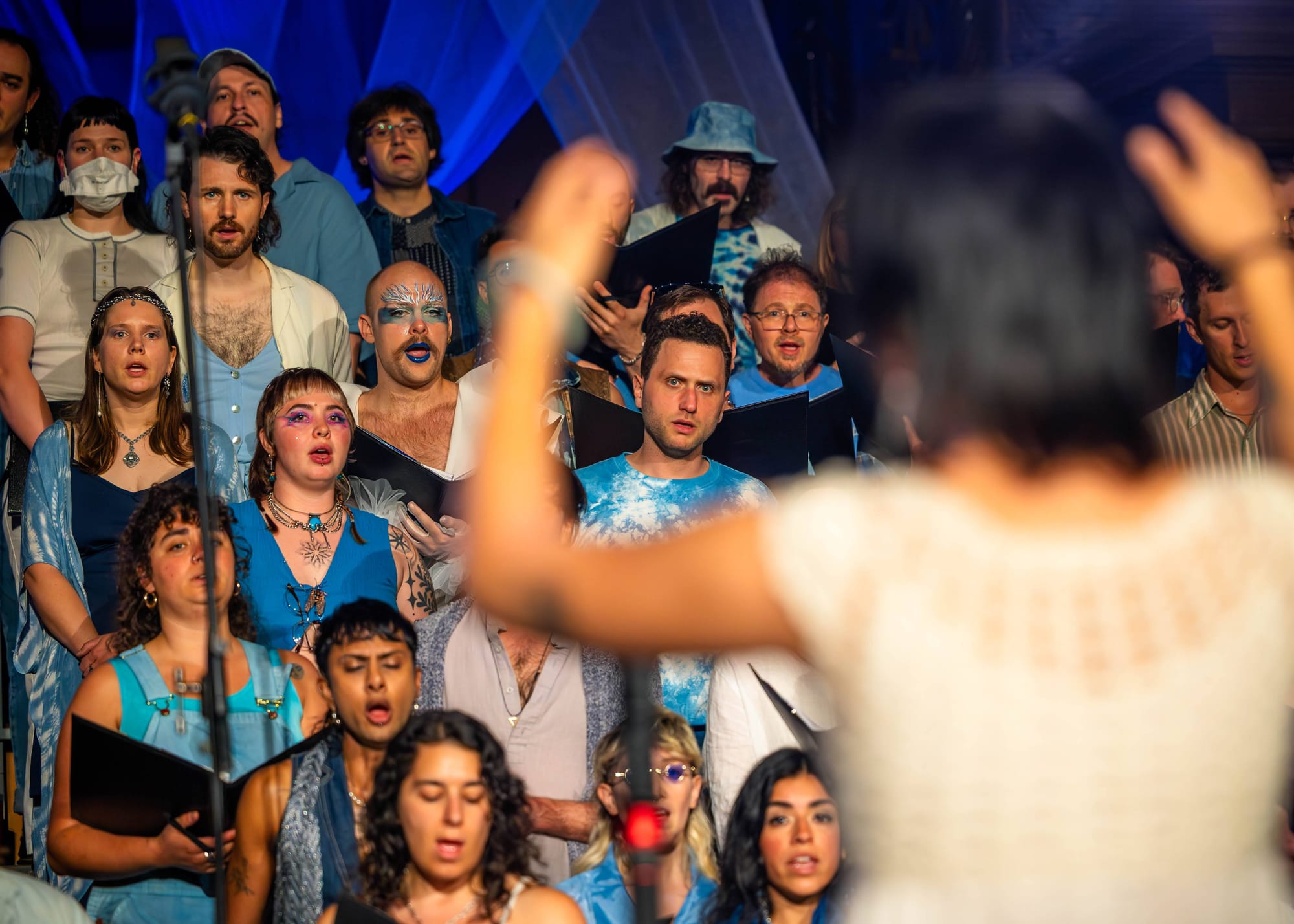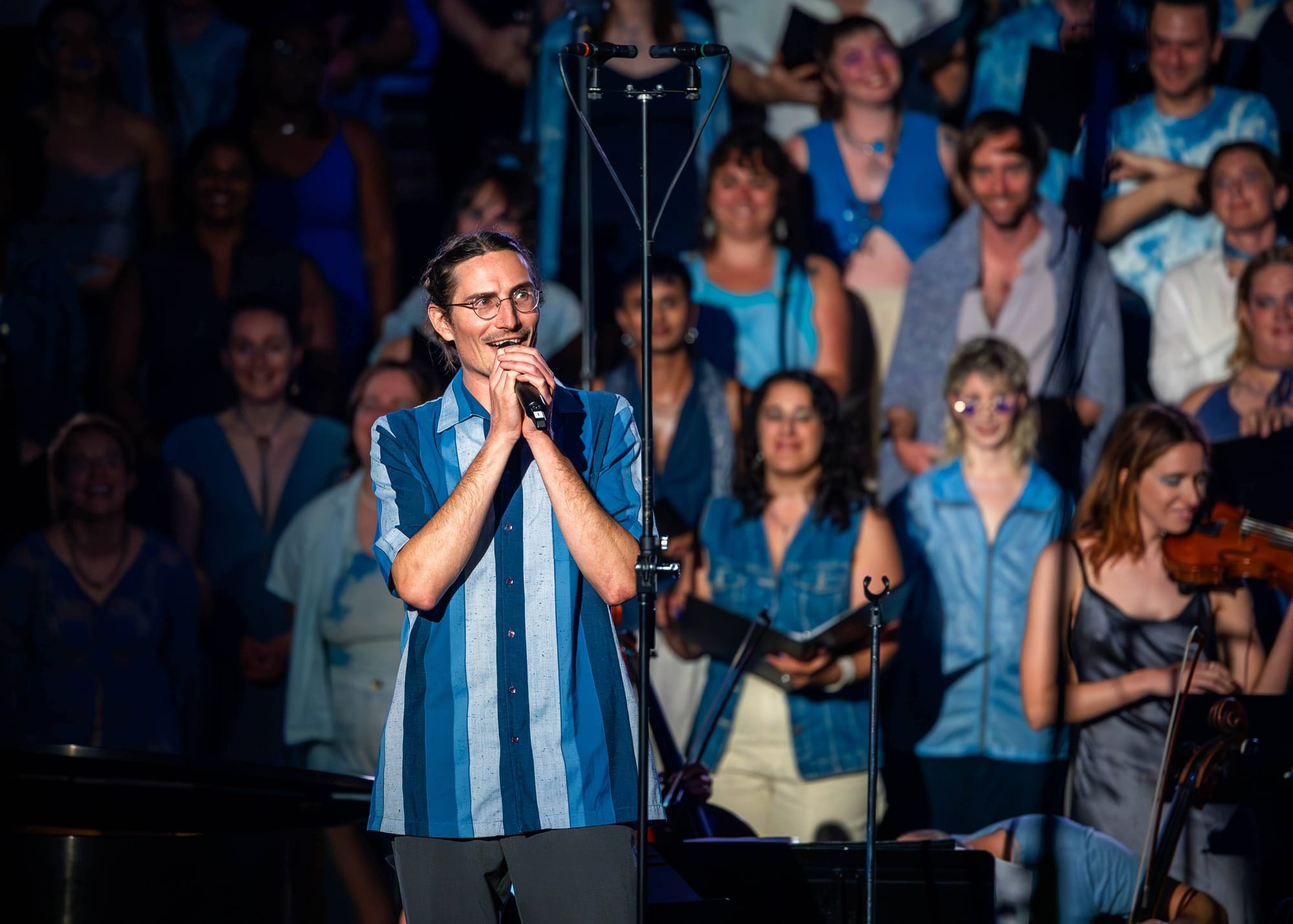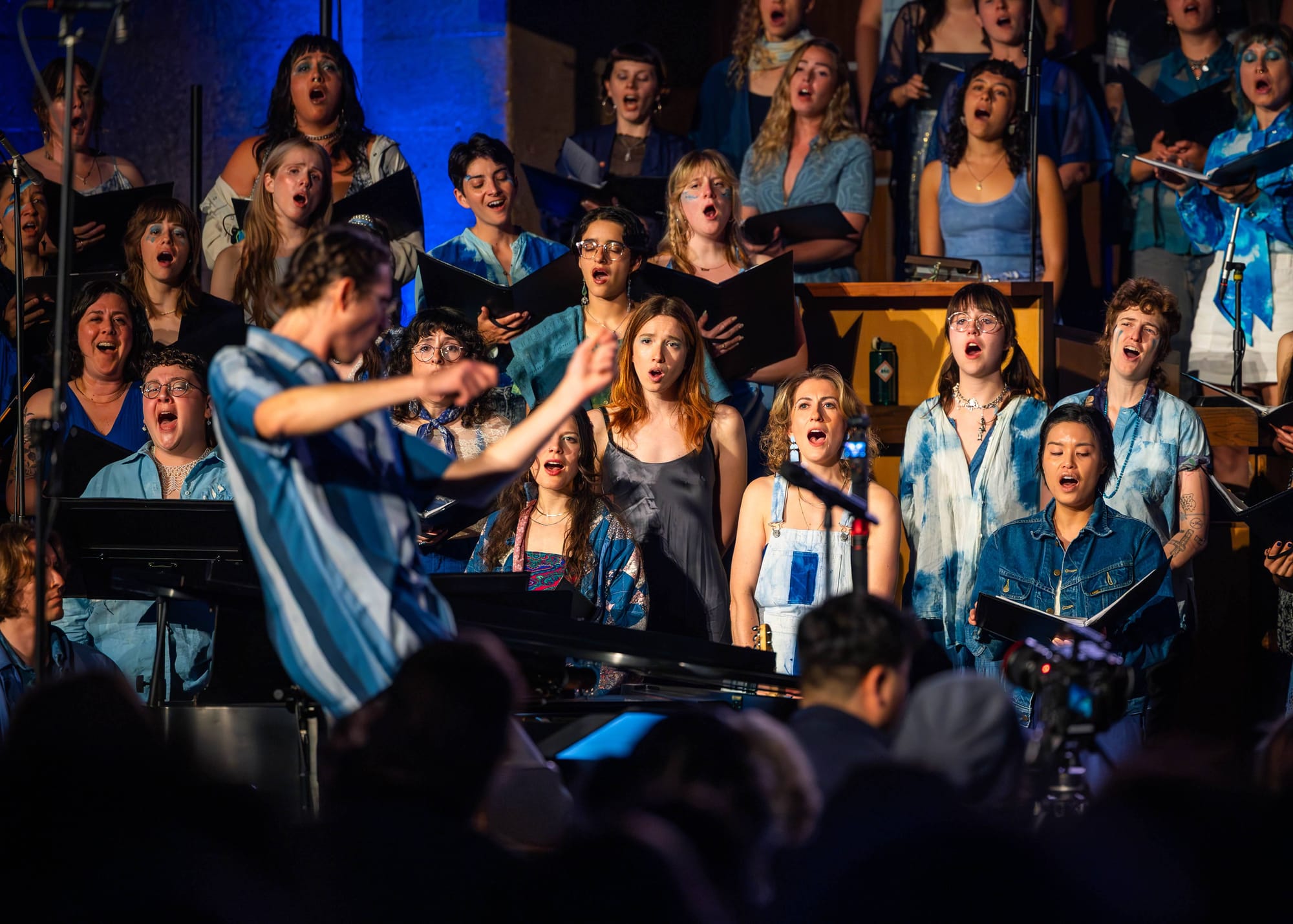Bay Area Chinese Leftists Are Making Language Political
We were in a very Chinese time in our lives. We decided to do something about it.
What happens when a DIY community choir becomes the next big thing?

When the Free Key Choir performed the ballad “I Shall Not Fear” by Bay Area songwriter Lizzy Dutton in their winter 2024 season, their 125 members were positioned across the stage, aisles and balcony of the First Presbyterian Church in Oakland, a hazy red light thrown over the sold-out crowd. The song’s resolute lyrics and reassuring melody had to navigate unnerving chords, eerie textures and quiet tension. The choir’s chilling improvised whispers and dissonant harmony clusters, though impressively goosebump-inducing in the resonant nave, are not unheard of techniques even for a community choir.
What is unique is that nearly all of the Free Key Choir’s repertoire is written by the members themselves, most often arranged by director Derek Sup. Many, like Dutton, contribute work they’ve recorded for their own bands and projects in the Bay Area independent music scene; some have never previously sung in a choir.
This do-it-yourself ethos is also central to its success. Since 2022, their seasonal performance weekends have sold out so reliably, they’ve booked continually larger churches and created their own Craigslist-lite ticket exchange. While the typical choral music audience appreciates more traditional material, younger pop audiences are drawn to the stylish and approachable. By including both, Free Key draws multi-generational crowds.
“People need to hear choral music that’s accessible,” said piano accompanist and occasional conductor Nüxia Peng. “Not everyone wants to hear Handel’s Messiah.”

The once-modest endeavor has become an organized and ambitious machine. A studio album is due for release later this year, and the group is set for three dates in the Pacific Northwest after a tour kick-off on September 12 at St. Paul Lutheran Church in Oakland.
Though its aims get higher, the group is trying to maintain a crucial amateur spirit. “This ragtag choir situation is very special,” singer Liana Warren said. “It’s what makes it different.”
For the last decade, Free Key Choir director Sup has served as music director and organist at St. Paul in Oakland’s Dimond District, notable for its early embrace of the LGBTQ community in the 1980s. Sup credits St. Paul for providing ample resources and a permissive structure for his projects.
In 2018, he and collaborator Lewis Patzner launched the Glenview Classical Series, hosting western classical and choral performances alongside jazz and more experimental fare. At the same time, he was playing in rock bands in the Bay’s DIY scene. He plays synth in the cosmic country band Katsy Pline, and at a recording session outside of LA he floated the idea of starting a choir to his bandmates.
They were down. Saxophonist Jeanne Oss started recruiting friends, including non-musicians. “I told them, ‘I’ve heard you sing karaoke, get in there!’” she said.
The 2022 debut season gathered around 35 members for the “American Singing Traditions” program that featured early folk, gospel standards, and the Beach Boys — but no original music. Yet the risers were full of singers from accomplished bands, home-studio producers, and tinkering aspirants. Sup realized the choir should perform their own songs.
“There’s few choirs who would take on such an ambitious project,” Sup said. “To arrange all brand-new music felt overwhelming, but it was doable.”
The new work cuts across genres. For the electro-pop of Bella Hangnail’s “Lake of Souls”, they removed the original’s dancefloor kicks but kept the woozy time signature, pumping house chords, and lovesick energy. Some songs were ready-made for classic choral adaptation: Rowan Katz’s “Killer B” lent itself to cascading melodic phrases and gospel verve.
In adapting pop material, Sup dodged cringy pratfalls: no a capella-style finger snaps or beat boxing. Guitars and synths, however, were welcome, as well as resplendent color palettes. The choir self-styles their dress, make-up and stage design to match each season’s theme, based on titles or lyrics from the program: Rust is a Slow Fire, Reservoir, After the Rain.
One early Oss recruit was fellow saxophonist and Midwesterner Cole Pulice, an electro-acoustic experimental artist who had just landed in the Bay from Minneapolis. When Sup approached them to compose a song, they were deeply flattered, but it came as a shock — they had never sung before joining the choir, let alone written for one. Lyrics weren’t exactly their bag: their ephemeral 22-minute ambient jazz piece “If I Don’t See You in the Future, I’ll See You in the Pasture” is perhaps the most unlikely recipient of a Pitchfork “Best New Track” accolade.
“It didn’t make sense,” Pulice remembers. “Do you know the kind of music I make?”
With Sup’s assistance, Pulice’s spiritual jazz procession “After the Rain” became a showstopping finale. Upon a gently shimmering wash of three electric guitars and church organ, Pulice patiently introduces the piece’s minimal, tender motif on sax. At first sustaining only small vowels, the choir gradually assembles the figure. As if in bloom, the voices grow more open and assertive with each iteration. By the end, the entire ensemble bellows as if beckoning rays of sunlight, Pulice exalting each phrase with jubilant Pharoah Sanders-like exclamations.
“I told Derek, this is one of the most special moments I’ve ever had playing music,” Pulice said. “Something about it being wordless amplified that feeling of tapping into something old and new. Something time eternal, pre-language.”
The choir steadily won buy-in from corners of the scene that were otherwise weary of anything seemingly religious, formal or corny. Zach Elsasser fronts the indie rock band Affectionately and is the former touring drummer for Taylor Vick, a Free Key alum and Anti Records recording artist. Vick nudged him to see an early concert.
“No shade, I thought it was going to be a community choir,” he said. “I thought it would be enjoyable. But I was blown away.” He quickly emailed to audition.
After each season wraps, Sup sends an email to the choir membership requesting songs to consider for the next program. He has applied the Free Key treatment to everything from commercial studio recordings to iPhone voice memos with hummed melodies.
In a sense, he argues, the rougher the demo, the better. “[They’re] so naked and freed from direction and treatment,” he says, “which is fun from an arranging perspective.”
A few of Sup’s arrangements are loyal to the character of the artist’s studio version, albeit supercharged with intricate harmony. The arrangement for Lucy Broom’s “Butte County”, a rollicking country barn burner, keeps the original’s brisk tempo and bluegrass string orchestration, but adds stacks of vocal harmony and soaring dynamic flourishes.

“Derek’s arrangements are incredible,” Broom said. “The way he weaves melodies is inspiring. It changes the depth of what is possible for me as a songwriter.”
But translating disparate genres for choir often means taking liberties, as well as exposing humble songwriters to the scrutiny of a large ensemble. Oss had submitted a freshly-recorded batch of solo acoustic material from her Judith Horn moniker, and Sup happened to select one she’d written about an exhilarating new relationship. That relationship ended right as rehearsals began.
“I had to sing with 120 people about my ex,” Oss laughs. “It felt like the universe was like, heh heh heh.”
“It was an incredible experience though, I got over it.”
The Free Key formula ingrains proper technique and structure in its less experienced members, but also reclaims the joy for skilled musicians who’ve been burned by their formal training. Sup and longtime collaborator Nathan Swedlow played in rock bands together after sweating through a prestigious Sacramento high school jazz program. “We all felt the rigor,” Swedlow said; Sup off-handedly cited the jazz conservatory nightmare film Whiplash.
Not only is it more chill in Free Key, they said, but even seasoned members have opportunities to challenge themselves. Peng was tapped to conduct for the first time and struggled with the high-stakes calibration of movement. It finally clicked on the concert stage.
“I was telling [the choir] to get louder with my hands, and there was so much sound,” they said. “I heard these crazy overtones. I knew the music — I knew nobody was singing those notes. It was a magical moment.”

The group’s explosive growth has necessitated formal structure, which has created avenues for members’ other talents. They now have numerous ways to contribute outside of the music: the “vibes” committee confers on stage aesthetics and costuming, while others tackle fundraising, AV and front of house. A Discord server was made for choir business, memes, and flyers for members’ shows.
The extra-musical work gives members a growing sense of ownership, something many would like to see formalized in its values. Free Key’s ranks tend to be highly politically engaged — early seasons had members reading public statements in support of fundraising for Palestinian and trans mutual aid charities, netting roughly $1,000 for each.
Sup said Bay Area ensembles like the San Francisco Gay Men’s Chorus and Oakland Interfaith Gospel Choir prove that choirs are an excellent vehicle for political expression. But conversations around messaging weren’t without strife. “To get over 100 people to agree to a statement is a daunting one,” Sup said. For greater equity, the group’s fundraising efforts have been channeled into a concert program fashioned like a zine, featuring poems, illustrations, and personal statements.
Swedlow notes that Free Key is structured like any other Western classical choir: a capital-D director at the top calling the shots. Still, he said Sup’s insatiable ambition is also contagious. “I think at times he wants it to be so monumental and fantastic, and that animates the whole entire body to do incredible things,” he said.
That growing creative vision could leave the casual and less-experienced behind. The organizational capacity of the group is getting stronger, as well as the singing: auditions for dwindling spots are increasingly competitive, attracting vocalists with extensive training. Sup wades through a stack of at least 50 song submissions every season. The entire choir is assessing if it is a modest and shaggy DIY endeavor or an ambitious project aiming to perfect its output.
“People point to me and say, ‘You’re the leader, what are we?’” Sup said. “It’s come to the point where I need to be deliberate. It’s too massive to decide together at this point. I have to figure that out.”
These contradictions have been keenly felt in the mixing of the Free Key studio album, due out this fall. Choral recordings are acoustically naturalistic, with a distant, museum-like remove. Indie rock records, even ornate ones, have a lone singer compressed to the very front of the speaker, right in the listener’s ear. Sup is attempting to split the difference, calling on the guidance of Sufjan Stevens and Brian Wilson.
The path becomes clearer when the collective’s disparate voices unite. In one session, the choir was tracking their cover of Judee Sill’s “Lopin’ Along Thru the Cosmos,” an orchestral ‘70s folk gem from a revered but commercially ill-fated California singer. Sup thought they were missing the magic.
“The last take, I turned off all the lights,” he said. The arrangement was very rubato, meaning the tempo subtly fluctuated with the movement of the song. But no one could see Sup’s conducting. “Everyone would just be listening to each other.”
The choir listened to itself, and sang.
“It was the most beautiful version of that song I’ve ever heard,” Sup said. “That was the take we’ll be releasing.”
Listen to the songs mentioned in this article on the Bay Area Current Spotify Free Key Choir playlist.